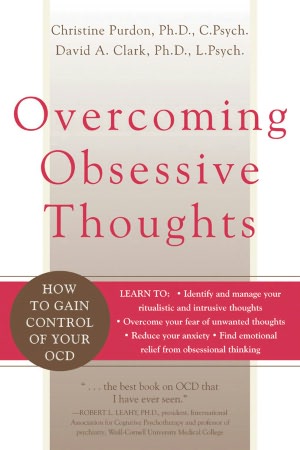Overcoming Obsessive Thoughts: How to Gain Control of Your OCD ebook download
Par haas kenneth le mercredi, juillet 15 2015, 01:01 - Lien permanent
Overcoming Obsessive Thoughts: How to Gain Control of Your OCD. David A. Clark, Christine Purdon
Overcoming.Obsessive.Thoughts.How.to.Gain.Control.of.Your.OCD.pdf
ISBN: 9781572243811 | 176 pages | 5 Mb

Overcoming Obsessive Thoughts: How to Gain Control of Your OCD David A. Clark, Christine Purdon
Publisher: New Harbinger Publications
Getting Control: Overcoming Your Obsessions and Compulsions - - Lee Baer PhD An internationally known expert and Harvard Medical School professor offers an up-to-date guide for treating Obsessive-Compulsive Disorder. These repetitions are referred to clinically as “compulsions.” Having thoughts that you can't get rid of. Commonly called, “obsessions,” obsessive thoughts seem to keep popping up and staying in your mind. Anne* was 34 years old when she thought she'd found her soul mate. Basically, it means to overcome the chronic paralysis that is induced by the tormenting thoughts and the futile, repetitive behaviors that they encourage. Unfortunately, for individuals suffering from obsessive-compulsive disorder (OCD) such thoughts often become increasingly obsessive and the behaviors associated with such obsessive thoughts become so compulsive that they interfere with an individual's relationships and ability to fulfill common, everyday tasks and responsibilities. Never mind that she was already married The problem is, it's hard to reflect on whether your tendencies are dangerous when everybody everywhere seems to be addicted to something—or at least that's what they say. You can overcome obsessive thinking. Creating positive, lasting change is rarely easy, and overcoming OCD will require your time, energy, and commitment. People with OCD A risk factor is something that increases your chance of getting a disease or condition. It may feel like it's out of your control. What does it mean to overcome OCD? Most people experience these types of thoughts; however, when they are associated with an anxiety disorder such as obsessive-compulsive disorder, depression, they may become paralyzing, panic-provoking, and persistent." Breaking the cycle The better you get at doing this, the more you will realize that your repetitive thoughts fade into the background and become less threatening and important to you. These obsessive This part of the brain is believed to be the area of impulse control. New research suggests that women fall prey to certain bad habits hard and fast—including an alarming breed of obsessive compulsive disorder. Obsessive-compulsive disorder (OCD) is an anxiety disorder in which an individual suffers from unwanted repetitive thoughts and behaviors. Complete your tasks and finish your chores.
